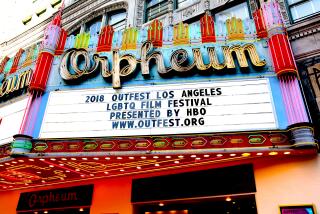Outfest screens groundbreaking ‘Different From the Others’
- Share via
Outfest, the 30-year-old organization that promotes lesbian, gay, bisexual and transgender equality through the arts, is screening the 1919 German silent movie “Different From the Others,” which it says is the earliest surviving feature film that deals explicitly with gay themes and characters.
The film, which stars Conrad Veidt as a violinist and music teacher who falls in love with one of his male students, will be shown Saturday evening as part of Outfest’s Legacy Awards ceremony at the Orpheum Theatre in L.A.
The evening, which will also honor producers Craig Zadan and Neil Neron with the Visionary Award, benefits Outfest’s Legacy Project, formed in 2005 with the UCLA Film & Television Archive for LGBT film preservation. In seven years, the Outfest Legacy project has collected more than 20,000 films and restored 18 films.
“Different From the Others,” said Kirsten Schaffer, executive director of Outfest, is a project that “both organizations were interested in for a very long time from both a historical perspective and from a preservation perspective. This film is so meaningful to the gay community. It is the oldest surviving film with any image of LGBT people.”
“Different From the Others” was made in protest of Paragraph 175, a law added to Germany’s Imperial Penal Code in 1871 that outlawed homosexuality and turned a blind eye to the blackmail of LGBT individuals.
The film’s screenwriter, Magnus Hirschfeld, who also appears in the movie, was a psychiatrist and a student of Freud, said archive head Jan-Christopher Horak.
“In Berlin, he ran the Institute of Sex Research,” Horak said. “He himself was gay and he had written a book which was published and caused a huge scandal in 1904 called ‘The Third Sex.”’
Hirschfeld saw a window of opportunity to address the plight of LGBT on film when the national censorship was eliminated in November 1918, after World War I ended.
Still, his drama caused an uproar because of its subject matter. Though the national ban had been lifted, the film could be censored at local levels. In August 1920, Germany reinstated national censorship and “this was one of the films on the hit list,” Horak said.
In 1927, Hirschfeld took 40 minutes from the film and added it to a gay-themed documentary, “Innocently Persecuted!” That fragment, with Ukrainian film intertitles, was found in the Russian Film Archive, Gosfilmofond. It is the only known material on the film to survive.
The Russians sold the UCLA archive a print of the footage. But Hirschfeld had altered the order of the scenes for the documentary, so UCLA preservationist Jere Guldin and the staff at the archive have been working to reassemble it.
“We found a very long synopsis and we are taking the material that survives and putting it into the order in which it was originally in the 1919 release of the film,” Horak explained. He said they are also putting in English intertitles — not only to replace the original but also to explain narrative gaps where there are missing scenes.
Because the restoration is not complete, the screening is being called a “sneak preview.” Robert Israel will play his new score for “Different From Others” on the Orpheum’s Wurlitzer organ.
“Different From the Others,” said Schaffer, is “significant and meaningful to our community because it demonstrates what can happen with a community comes together in opposition to something like Paragraph 175. Magnus Hirschfeld was on a mission to change public perception of gay people, and for 100 years we have been trying to change public perception of gay people.”
More to Read
Only good movies
Get the Indie Focus newsletter, Mark Olsen's weekly guide to the world of cinema.
You may occasionally receive promotional content from the Los Angeles Times.











